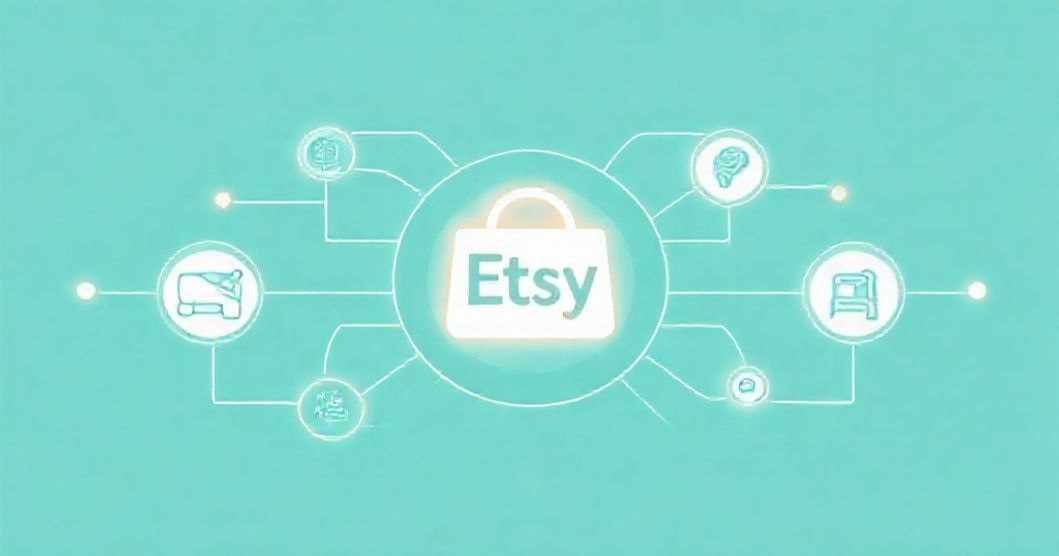Managing an Etsy shop can be a rewarding endeavor, but as your business grows, so does the complexity of daily operations. Etsy integrations offer a powerful solution, allowing sellers to connect their shop with various external applications and services. These integrations are designed to automate repetitive tasks, synchronize data across platforms, and ultimately enhance overall business efficiency. By leveraging the right tools, sellers can save significant time, reduce manual errors, and focus more on creativity and growth, transforming their Etsy venture into a more streamlined and profitable enterprise.
Understanding Etsy Integrations for Enhanced Store Management
Etsy integrations refer to the process of linking your Etsy shop with third-party software applications. These tools are designed to extend Etsy’s native functionalities, addressing common challenges faced by online sellers. The primary goal is to create a more cohesive and automated operational environment. From managing inventory across multiple sales channels to simplifying shipping and accounting, robust Etsy integrations are crucial for scaling operations. They help maintain accuracy and consistency, which are vital for customer satisfaction and long-term business success in the competitive e-commerce landscape.
Key Benefits of Integrating Your Etsy Shop
Implementing effective Etsy integrations brings a multitude of benefits, significantly improving the operational efficiency of your business. Automation of tasks like order processing, inventory updates, and shipping label generation frees up valuable time, allowing sellers to concentrate on product development and marketing. Furthermore, integrations reduce the likelihood of human error, ensuring accurate data across all platforms. This leads to better inventory control, faster order fulfillment, and more reliable financial reporting. Ultimately, these efficiencies contribute to a more professional brand image and an improved customer experience, fostering loyalty and repeat business.
Essential Integration Categories for Etsy Sellers
For Etsy sellers aiming to optimize their business, understanding the various categories of available integrations is fundamental. These categories typically include inventory management, shipping and fulfillment, accounting, and cross-platform selling. Each category addresses a specific operational need, providing specialized tools to streamline workflows. For instance, inventory integrations ensure stock levels are accurate, while shipping tools automate label creation. Accounting integrations simplify financial tracking, and cross-platform solutions help manage sales across multiple marketplaces. Selecting the right mix of these Etsy integrations is key to building a robust and efficient e-commerce ecosystem.
Inventory Management and Order Fulfillment Integrations
Effective inventory management is critical for any Etsy shop, especially for those selling across multiple channels. Integrations specializing in inventory allow sellers to centralize product data and automatically synchronize stock levels in real-time. This prevents overselling and ensures that customers always see accurate availability. Beyond just stock, these tools also streamline order fulfillment by consolidating orders from various platforms into a single dashboard. Many solutions offer features like automated tracking number generation and status updates, making the entire fulfillment process smoother and more transparent for both seller and buyer, enhancing overall operational consistency.
Streamlining Shipping and Label Creation
Shipping is a significant component of any e-commerce business, and Etsy integrations designed for shipping can dramatically simplify this process. These tools connect your Etsy shop directly with various shipping carriers, enabling automated label creation, discounted shipping rates, and seamless tracking updates. By integrating, sellers can print multiple labels at once, compare carrier prices, and manage all shipments from a centralized interface. This not only saves considerable time but also helps reduce shipping costs and improves the accuracy of delivery information. Efficient shipping operations are vital for customer satisfaction and the smooth running of your entire order pipeline.
Financial Tracking and Accounting Integrations
Managing the financial aspects of an Etsy shop, including sales, expenses, and taxes, can be complex. Accounting integrations simplify this by automatically syncing your Etsy sales data with your preferred accounting software. This eliminates the need for manual data entry, reducing errors and ensuring accurate financial records. Sellers can easily track income, expenses, and profitability, making tax season significantly less stressful. Comprehensive financial insights provided by these integrations empower sellers to make informed business decisions, identify trends, and better understand the overall health and performance of their Etsy enterprise, fostering sustainable growth.
Expanding Your Reach: Integrating Etsy with Other Platforms
Many Etsy sellers choose to expand their reach by selling on other e-commerce platforms or through their own dedicated websites. Integrating Etsy with platforms like Shopify or a custom e-commerce site allows for centralized product management and synchronized inventory. This means sellers can manage listings, orders, and customer data from a single point, avoiding the complexities of juggling multiple separate systems. Such cross-platform Etsy integrations are invaluable for expanding market presence without duplicating effort. They ensure consistent branding and product information across all sales channels, simplifying growth and broader market access.
Choosing the Right Etsy Integration Tools
Selecting the most suitable Etsy integration tools requires careful consideration of your specific business needs and goals. Key factors include the cost of the integration, the features it offers, its ease of use, and compatibility with your existing workflows. Many integration solutions offer tiered pricing models, with basic plans often starting from approximately $20 to $50 per month, increasing with additional features or transaction volume. It is wise to look for tools that offer excellent customer support and clear documentation. Thoroughly evaluating these aspects will help ensure that your chosen integrations truly enhance efficiency and contribute positively to your Etsy shop’s growth trajectory.
Optimizing Your Etsy Business with Strategic Integrations
Embracing Etsy integrations is a strategic move for any seller looking to scale their business and enhance operational efficiency. By carefully selecting and implementing the right tools for inventory, shipping, accounting, and cross-platform sales, you can transform your daily workflows. These integrations not only automate tedious tasks and minimize errors but also provide valuable insights into your business performance. A well-integrated Etsy ecosystem empowers sellers to dedicate more time to creativity and growth, ensuring a more organized, profitable, and sustainable future for their craft or product-based venture. Continuous evaluation of your integration stack ensures ongoing alignment with evolving business demands.




